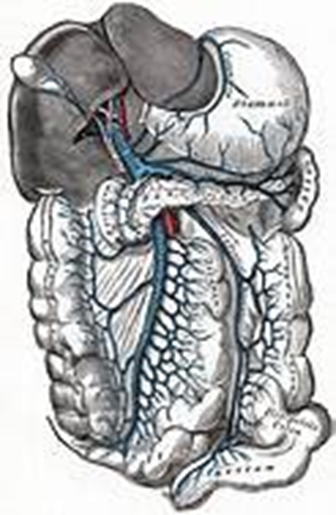The nurse is caring for a client with cirrhosis and portal hypertension. Which statement by the client is cause for the greatest concern?
"I have a tight sensation in my lower leg when I forget to put my feet up."
"I can't button my pants anymore because my belly is so swollen."
"I'm very constipated and have been straining during bowel movements."
"When I sleep, I have to sit in a recliner so that I can breathe more easily."
The Correct Answer is B
Choice A: “I have a tight sensation in my lower leg when I forget to put my feet up.” This statement may indicate the presence of edema, which is common in cirrhosis due to hypoalbuminemia and sodium retention. However, it is not as immediately concerning as other symptoms because it can often be managed with diuretics and compression. It is important to monitor for worsening edema, as it can lead to increased discomfort and risk of skin breakdown.
Choice B: “I can’t button my pants anymore because my belly is so swollen.” This statement is concerning because it suggests the development of ascites, which is the accumulation of fluid in the peritoneal cavity, causing abdominal swelling. Ascites can lead to abdominal discomfort, difficulty breathing, and is a sign of advanced liver disease with significant portal hypertension. It requires medical evaluation and management, which may include paracentesis (removal of fluid), diuretics, and sodium restriction. Cirrhosis is a late stage of scarring (fibrosis) of the liver caused by many forms of liver diseases and conditions, such as hepatitis and chronic alcoholism. Portal hypertension is an increase in the blood pressure within a system of veins called the portal venous system. Veins from the stomach, intestine, spleen, and pancreas merge into the portal vein, which then branches into smaller vessels and travels through the liver.
Choice C: “I’m very constipated and have been straining during bowel movements.” While constipation is uncomfortable and can indicate dietary issues or side effects from medication, it is not typically a direct complication of cirrhosis or portal hypertension. However, straining during bowel movements can increase the risk of bleeding from esophageal varices if they are present, so it is important to manage constipation to prevent potential complications.
Choice D: “When I sleep, I have to sit in a recliner so that I can breathe more easily.” This statement indicates orthopnea, which can be associated with ascites or pleural effusions (fluid in the lungs), both of which can occur in the setting of cirrhosis and portal hypertension. While this symptom is concerning and affects the client’s quality of life, it is generally less concerning than the development of ascites, as it can be managed with adjustments in sleeping position and medical management of the underlying fluid accumulation.

Nursing Test Bank
Naxlex Comprehensive Predictor Exams
Related Questions
Correct Answer is ["A","B","E"]
Explanation
Choice A reason: Asterixis, also known as "liver flap," is a tremor of the hand when the wrist is extended, often seen in hepatic encephalopathy as a result of altered brain function.
Choice B reason: A change in orientation, including confusion and altered consciousness, is a hallmark of hepatic encephalopathy, reflecting the brain's impaired ability to process information.
Choice C reason: Anorexia may be present in cirrhosis, but it is not a specific indicator of hepatic encephalopathy.
Choice D reason: Ascites is a common complication of cirrhosis due to portal hypertension but is not a direct indicator of hepatic encephalopathy.
Choice E reason: Fetor hepaticus, a musty odor of the breath, is a distinctive symptom of hepatic encephalopathy caused by the presence of mercaptans in the breath as the liver fails to break down sulfur-containing amino acids.
Correct Answer is ["35"]
Explanation
- Step 1: Identify the total volume to be administered. The nurse is scheduled to administer 840 mL of enteral nutrition over a 24-hour period.
- Step 2: Identify the total time over which the volume is to be administered. The total time is 24 hours.
- Step 3: Calculate the rate at which the infusion pump should be set. We can do this by dividing the total volume by the total time:
- Rate = Total Volume ÷ Total Time.
- Rate = 840 mL ÷ 24 hours.
- Calculating the division gives us: Rate = 35 mL/hr.
set the infusion pump to deliver 35 mL/hr.
Whether you are a student looking to ace your exams or a practicing nurse seeking to enhance your expertise , our nursing education contents will empower you with the confidence and competence to make a difference in the lives of patients and become a respected leader in the healthcare field.
Visit Naxlex, invest in your future and unlock endless possibilities with our unparalleled nursing education contents today
Report Wrong Answer on the Current Question
Do you disagree with the answer? If yes, what is your expected answer? Explain.
Kindly be descriptive with the issue you are facing.
